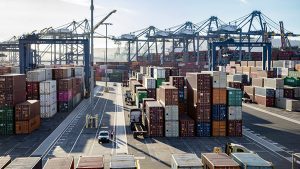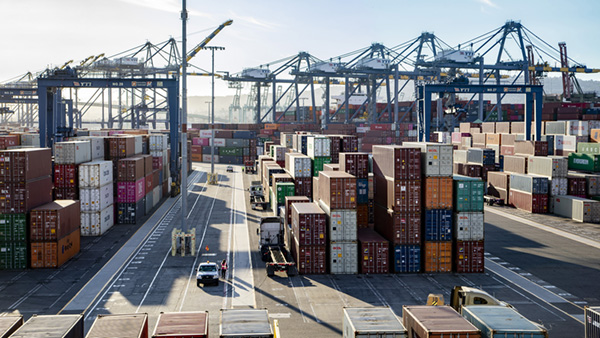
The ports of Los Angeles and Long Beach on Monday announced plans to charge ocean carriers for import cargo that lingers on marine terminals beginning Nov. 1.
The new surcharge – the latest in an effort to tackle growing cargo volumes and congestion at the nation’s two busiest seaports – involves charging ocean carriers $100 for every container that stays on the terminal for nine or more days before it leaves by truck. If a container is supposed to leave by rail, ocean carriers will be charged $100 for every container that lingers for three or more days.
In both cases, the cost increases $100 every day a container dwells beyond the allowed time, the ports said in their Oct. 25 statement.
“We must expedite the movement of cargo through the ports to work down the number of ships at anchor,” said Port of Los Angeles Executive Director Gene Seroka. “Approximately 40% of the containers on our terminals today fall into the two categories. If we can clear this idling cargo, we’ll have much more space on our terminals to accept empties, handle exports, and improve fluidity for the wide range of cargo owners who utilize our ports.”
With the escalating backlog of ships off the coast, we must take immediate action to prompt the rapid removal of containers from our marine terminals, said Port of Long Beach Executive Director Mario Cordero.
“The terminals are running out of space, and this will make room for the containers sitting on those ships at anchor,” Cordero said.
John D. Porcari, Port Envoy to the Biden-Harris Supply Chain Disruptions Task Force, said he supports the ports’ actions.
“These actions aim to expedite the movement of goods and reduce congestion in our ports,” he said. “As our economy continues to grow, increased demand and disruptions caused by the pandemic are putting our supply chains to the test.”
“While we’ve seen new records set in terms of throughput this year at West Coast ports, we need more players throughout the supply chain to keep stepping up,” he added. “The federal government will continue to bring together private companies and stakeholders from across the supply chain and serve as an honest broker helping to surface solutions like this to address supply chain disruptions.”
Money from the surcharges will fund programs geared toward creating “efficiency, accelerate cargo velocity, and address congestion impacts throughout the San Pedro Bay,” according to the ports.

